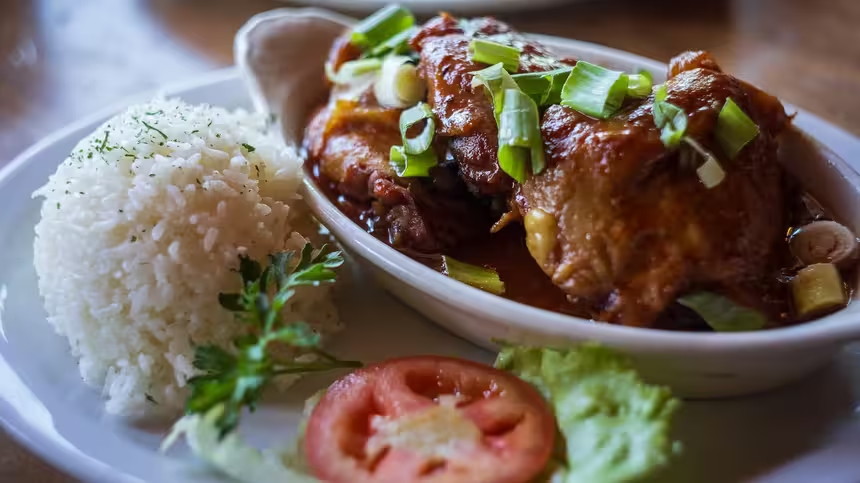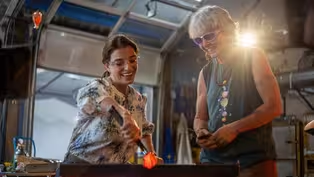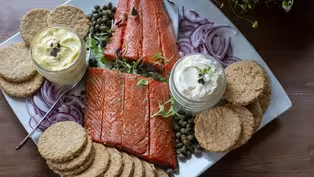
Uncovering Alaska's Filipino Soul
Clip: Episode 2 | 7m 10sVideo has Closed Captions
Fascinating stories and food from Juneau’s vibrant Filipino community.
Pati Jinich joins Filipino storyteller Tasha Elizarde at KTOO radio to chat about the history and heritage of Filipinos in Alaska. Tasha, a passionate advocate for Filipino culture and the force behind the oral history project "Mana," shares stories of how Filipinos were drawn to Alaska. Afterward, they head to the Filipino Community Hall to taste some classic Filipino comfort foods.
Problems playing video? | Closed Captioning Feedback
Problems playing video? | Closed Captioning Feedback
Support for PATI JINICH EXPLORES PANAMERICANA is provided by Marriott International, La Costeña, Texas A&M International University, Visit Anchorage, Travel Juneau, Travel Yukon, and Chicanos Por La Causa.

Uncovering Alaska's Filipino Soul
Clip: Episode 2 | 7m 10sVideo has Closed Captions
Pati Jinich joins Filipino storyteller Tasha Elizarde at KTOO radio to chat about the history and heritage of Filipinos in Alaska. Tasha, a passionate advocate for Filipino culture and the force behind the oral history project "Mana," shares stories of how Filipinos were drawn to Alaska. Afterward, they head to the Filipino Community Hall to taste some classic Filipino comfort foods.
Problems playing video? | Closed Captioning Feedback
How to Watch Pati Jinich Explores Panamericana
Pati Jinich Explores Panamericana is available to stream on pbs.org and the free PBS App, available on iPhone, Apple TV, Android TV, Android smartphones, Amazon Fire TV, Amazon Fire Tablet, Roku, Samsung Smart TV, and Vizio.
Buy Now

The Pati Jinich Recipe Collection
Find Pati Jinich recipes from this series and more on PBS Food.Providing Support for PBS.org
Learn Moreabout PBS online sponsorshipBostin: From listener-supported KTOO, broadcasting live from the homelands of the Áak'w Kwáan and on demand as a podcast.
On today's show, a special chat with KTOO's Tasha Elizarde and guests.
All that coming up today on "Juneau Afternoon."
Pati, voice-over: Bostin Christopher, host of KTOO's "Juneau Afternoon," invited me to guest host an episode spotlighting Juneau's vibrant Filipino community, the largest minority group in the city.
[Speaking Indigenous language] Thank you for joining the conversation.
Well, hello, Juneau!
This is Pati Jinich.
Oh, my gosh, radio is so much fun!
Yes, I agree, I agree.
Pati, voice-over: Melvin Cristobal is a local chef, Aims Villanueva is a former restaurateur, now holistic nutritionist, and Tasha Elizarde is a producer for KTOO.
I also run a media collective called Mana or Mana Alaska.
Uh, we are a group of Filipino storytellers that works to reclaim and share the stories of Filipinos around the state.
Pati, voice-over: Tasha's project is dedicated to preserving the past to inspire and empower future generations.
You've worked on this project collecting the oral history of Filipinos in Alaska.
Tasha: Mm-hmm.
Pati: What are you getting?
Tasha: We connect with so many community members around the state who have just not had their stories been told and not have had their stories been told by other people who are like them.
I can amplify our voices on not just a local scale, but even a national scale.
Pati, voice-over: Aims' family was recently featured.
Aims: My mom was, like, "I--My story's not important," and that part, like, killed a part of my soul because I was like, "Are you serious?
I'm part of your story," and so when they ended up filming, it was a whole different layer of just, like, healing generational trauma, ancestral trauma.
[Slide projector clicks] Pati, voice-over: In the early 1900s, Filipinos were drawn to Alaska by the booming canning and gold industries.
♪ Pati: Can we talk a little bit about intergenerational trauma and what are the lessons learned, or where do you move forward with all of these collections of stories?
You know, like, there's so many layers between, you know, being Filipino, what generation, um, you've been when you come to Alaska, all these different things.
I think about how, you know, the Philippines has been through colonization, continues to deal with the legacy of colonization and imperialism.
Um, Alaska, the same situation, as well, and for me, like a lot of my identity as a Filipino, I was able to accept and learn because of the conversations that a lot of Indigenous friends would have around me about how do you come to terms with how people view you because of the legacy of colonization?
What I realize is there are so many challenges to just being able to tell the stories of Filipinos, um, because m-most of the time a lot of media institutions don't really care.
They don't want to cover us in the way that is true to us and true to our community.
I didn't really think anything different growing up.
I just knew I was Filipino.
I knew who everyone was.
like, when I go to the store, I say, "Hi, Auntie, hi, Uncle."
You know, it was very tightknit, but then when I go down south and I see other Filipinos or, like, other cultures, it's a little different for me because I was, like, "Oh, you guys--isn't that your aunt or something that you say hi in the store?"
And they're like, "Oh, no, I don't know them."
I was like, "Oh, this is totally different."
This is weird.
I was like, "They're not my aunts."
Because there's a certain culture in Juneau.
There's a certain culture in Alaska that sometimes I don't really feel like I fit, but when it comes to Filipinos, I'm like, yeah, everyone's accepted.
Melvin: There's a Filipino community hall here... and then growing up, I would go there all-- like, for Filipino parties, holidays, and all that stuff, and then just building the community from the young age already.
I'm just like, "Oh, this is this is who I am."
Like, I remember talking to my cousin, too, in the Philippines that was like, "Cuz, you're Filipino," and I was like, "Cuz, I don't think I'm Filipino."
Aims: Oh!
Pati: What are you?
That was my next question.
Pati: What--what are you?
Melvin: Yeah, I was like-- I'm more like--I feel like I'm American Filipino because, like, what you guys are going through is totally different from, like, my regular day life, like.
But then--sorry to interrupt, but you said it's very different from the Filipinos in the Lower 48, so it sounds to me like you're Alaskan Filipino.
That's--see, that's another thing, too... Tasha: Ooh!
We coined a new term today.
because I would go down south, too, and I'd see other Filipinos like, "Oh, hey, Mabuhay!"
And they're like, "What the hell are you talking about?"
[Laughter] What is it about Filipino food in Alaska that is different from Filipino food anywhere else?
My mom would cook sinigang, which is a type of soup.
She always uses Alaska salmon, and that's something that you don't actually do in the Lower 48, but it's actually specifically Filipino Alaskan food.
Thank you so much for this conversation.
Aims: Thanks, Pati.
Melvin: Thank you, Pati.
I already feel very welcome, and I'm not Filipino or Alaskan.
You've been a baddie, though.
Yeah, you true, and we're gonna find some food, too.
Let's go eat.
Yes, yes, yes.
♪ Pati, voice-over: The Filipino community hall downtown has been a living legacy for more than 50 years, where generations have come together to keep the culture thriving.
Melvin: I just remember, like, going in this hall, always, like, playing with my cousins.
You see everyone come in here, you greet every single person because that's your aunt, that's your uncle, that's your cousin, that's your grandma, that's your grandpa.
Pati: What are we eating?
Tasha: OK, yes.
So what have we got here first?
This might be chicken.
Pati, voice-over: Today's menu includes classic Filipino comfort food from Carrillo's, a street vendor right outside the building.
The cooks even use this hall to prepare the food.
They're also related to Melvin.
Pati: He says he's your nephew.
Man: Yes.
Melvin: Ha ha ha!
Does he behave?
Melvin: Ha ha ha!
Man: Do I have to say yes?
Pati: Oh, no.
[Laughter] Tasha: That was a long pause.
That was a very long pause.
Right now, he's behaving.
Pati: This is the papaitan?
Melvin: Yes, ma'am.
So tell me about the papaitan.
Um, it's a soup.
[Laughter] And this is the tripe and everything else?
Melvin: Mm-hmm.
Bile and all that.
The intestine.
I'm just gonna eat it with this.
Oh!
That is very...intense.
Intestine.
Ha ha ha!
Intense intestine.
Pati: And this?
Melvin: This is, um, the pig blood.
Just pig blood?
And then there's liver, too.
Pig blood, pig liver?
Melvin: Yes.
Tasha: Yeah.
You love it?
We grew up eating it.
Ha ha ha!
Please.
I'm used to this one.
See, I didn't know that was a Filipino thing.
Nah, bro.
Yeah.
I've never seen it.
Because I just--to me, it's just like, "Oh."
How do we feel?
Pati: Mmm!
Melvin: Yeah?
Right?
Tasha: OK. Pati: Mmm!
I'm kind of surprised, too.
What do you mean you're surprised?
Because I haven't had in a long time.
Pati: It's comforting.
Melvin: Yeah.
Tasha: Which one do you like better?
Which one do you like better?
Melvin: This one?
Yeah.
Tasha: OK. Can I just go with my hand or with a-- Honestly, You could just take it.
Pati: Oh, really?
Tasha: Yeah.
We eat like this, or we eat with our hands.
Tasha: We all--we got our own.
Pati: Mmm!
This is so good.
Melvin: Pati, you're always welcome here.
Beautiful & Unbreakable: Glassblowing in Yukon
Video has Closed Captions
Clip: Ep2 | 5m 42s | Pati Jinich visits Lumel Studios to try glassblowing and learns it’s more than just art. (5m 42s)
Ron Chambers: Stories from Life in the Yukon
Video has Closed Captions
Clip: Ep2 | 6m 3s | Pati Jinich learns about life in the Yukon Territory from “Mr. Yukon 2024” Ron Chambers. (6m 3s)
Providing Support for PBS.org
Learn Moreabout PBS online sponsorshipSupport for PBS provided by:





















